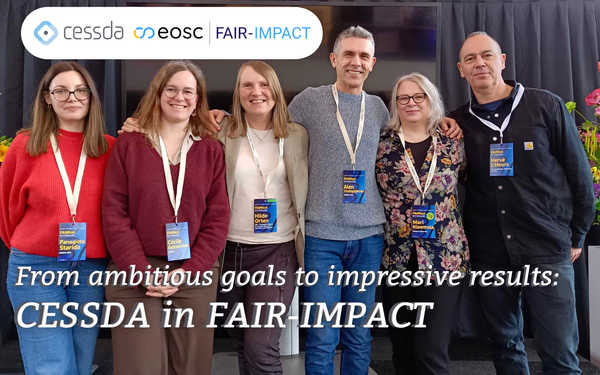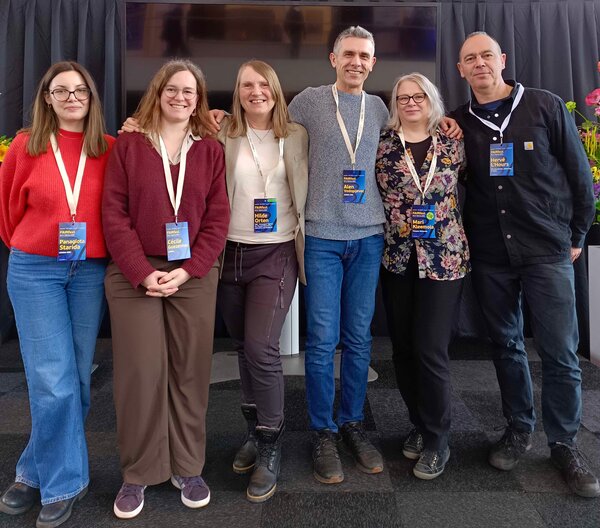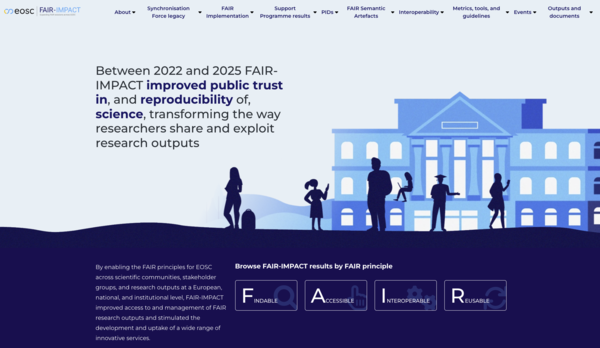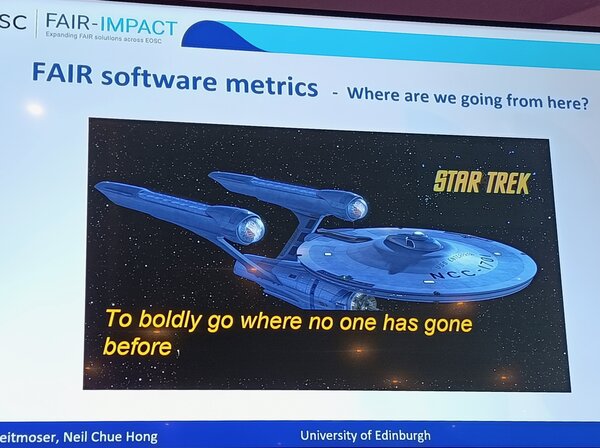
From ambitious goals to impressive results: CESSDA in FAIR IMPACT
CESSDA contributed to expand FAIR solutions across the EOSC (European Open Science Cloud) by joining the FAIR IMPACT project, running from June 2022 to May 2025, and funded by the European Commission under the Horizon Europe programme. The project, coordinated by DANS and supported by 27 additional partners from 11 countries, improved reproducibility and public trust in science, transforming the way researchers share and exploit research outputs. CESSDA joined the project with partners from the UK (UKDS) and Norway (Sikt and the CESSDA Main Office).
Practical implementation of the FAIR principles
The project was based on real-life use cases in four scientific domains - two of which were conducted by UKDS in Social Sciences. Going further, the project provided support and cascading grants to enable testing of specific tools, approaches and methods. CESSDA Service Providers and Partners made good use of this opportunity, and shared their story:
-
French Service Provider Progedo enabled applicants to test the FAIR-IMPACT guidelines and gathered valuable feedback on their usefulness, relevance, and practicality
-
Bosnian-Herzegovinian Partner DASS-BiH tested the FAIR-IMPACT guidelines for trustworthy, FAIR-enabling repositories, providing feedback to improve metadata exposure and transparency
-
German Service Provider GESIS assessed their readiness for an EOSC-compliant Persistent Identifier policy using the Compliance Assessment Toolkit, contributing to best practice development
-
Lithuanian Partner LIDA evaluated its infrastructure and PID policy maturity with the Compliance Assessment Toolkit, identifying strengths, gaps, and areas for improvement
-
Swedish Service Provider SND: developped recommendation for Sweden and used FAIRCORE4EOSC's Compliance Assessment Toolkit to further develop the PID policy of the Swedish National Data Service.
UKDS also contributed to the targeted landscape analysis conducted to identify viable tools, methods and solutions produced by other FAIR-related projects funded by the European Commission. The resulting FAIR Implementation Framework (FIF) catalogue of resources is a precious resource, accessible via the FAIR-IMPACT website.

The CESSDA team at the FAIRFest, the FAIR IMPACT concluding event in The Hague, February 2025.
From left: Panagiota Starida and Cécile Guezennec (CESSDA MO), Hilde Orten (Sikt), Alen Vodopijevec (CESSDA MO), Mari Kleemola (DANS), and Hervé L'Hours (UKDS)
Persistent identifiers (PIDs)
As part of the work on improving Findability (the “F” in FAIR), FAIR IMPACT contributed to enable and support a sustainable implementation of PIDs in the EOSC context by working together with PID service providers and infrastructures to meet user needs, align with EOSC PID Policy, and to maximise the uptake of good PID practices.
UKDS produced the use case Change triggers impacting PID generation for sensitive data within the Social Sciences as part of this effort. The use cases span different stages of the research life cycle, demonstrating the critical role of PIDs in processes such as data production workflows, complex data citation events, and the management of metadata and sensitive data. Key topics explored include versioning, granularity, kernel metadata, machine-actionability, and research reproducibility in relation to PID minting practices.
UKDS also co-authored a report on the best practices of Persistent Identifiers (PIDs) for end users, as defined by seven integrated use case partners participating in the FAIR-IMPACT project. It sought to address the lack of standardised cross-domain guidance and widely accepted best practices on PID usage by providing clear, adaptable, and applicable guidance across multiple scientific domains.

The FAIR principles on the newly designed FAIR-IMPACT website:
Findable, Accessible, Interoperable, and Reusable
Interoperability
Another key topic of the project covered the “I” in FAIR: Interoperability. FAIR IMPACT reviewed, designed, and promoted interoperability mechanisms across domains and institutions and fostered global alignment of FAIR frameworks.
UKDS participated in this effort with a use case on Advancing access interoperability with ODRL. The focus of this use case was on enabling machine actors to better interpret the currently ambiguous semantics of digital objects’ access and usage conditions and, secondly, to provide more specific guidance on how to encapsulate the definition and execution of access and usage conditions in FAIR signposting practices.
As for Sikt, they contributed experiences related to legal and organisational interoperability from their cross-domain data integration project, EOSC Future’s Science Project 9, ‘Climate Neutral and Smart Cities’. They also developed the DDI-CDI Converter (Prototype), a tool designed to convert data in the proprietary data formats STATA and SPSS, and CSV, to the standard cross-domain data and metadata standard DDI-CDI. The work on the tool, which started in the WorldFair project, was carried out to facilitate the implementation of the DDI-CDI profile used by CDIF, and to support training activities within the DDI community.
For more on the DDI-CDI converter tool, read the draft paper and check out the GitHub Repository
As part of the series of “FAIR National Roadshows” organised to promote FAIR-IMPACT recommendations, good practices, and assessment tools, CESSDA also participated in the Norwegian Roadshow in September 2024: Sikt presented their work on interoperability issues across data from social and environmental sciences, with focus on metadata standards, provenance information, and the importance of interdisciplinary collaboration. Sikt’s work was also presented at EGU24 and at the FAIRFest in the Hague 2025. UKDS also supported the UK National Roadshow, which looked to facilitate discussions about the UK’s participation in EOSC and what services could be included in a potential UK node.
Metrics for FAIR assessment in the context of Social Sciences and Humanities (SSH)
One of the goals of the project was to enable the ‘FAIRification’ of different research objects such as datasets, software and semantic artefacts originating from a large range of scientific disciplines. This includes the provision and extension of FAIR assessment metrics and associated tools and their adoption to the needs and requirements of a variety of research communities.
UKDS contributed to the report “Implementing metrics for automated FAIR digital objects assessment in a disciplinary context”, which presented an analysis of SSH community FAIR-aligned habits and practices carried out using available literature and whitepapers, data collected using standard interfaces provided by the community, as well as FAIR Implementation Profiles (FIPs) from a number of SSH data repositories. Based on this analysis, the authors identified an appropriate SSH sub-community, the social sciences, for which they defined a set of discipline specific metrics and tests derived from the FAIRsFAIR data assessment metrics. Working in collaboration with CESSDA’s Trust and Landscape Working Group, both the generic and the Social Science metrics and tests were reviewed by CESSDA Service Providers, with suggested changes being incorporated in version 0.8 of F-UJI’s metrics.

FAIR-IMPACT pushed the envelope for FAIR data, by exploring new options, something Neil Chue Hong from the University of Edinburgh demonstrated at FAIRFest.
FAIR principles carries on
The work conducted in FAIR IMPACT marks a stepping stone in the evolving FAIR landscape. The FAIR IMPACT website now hosts a wide range of resources and information to guide researchers, repository managers, research performing organisations, policy makers and citizen scientists towards a FAIR data management cycle. CESSDA continues to support the implementation of FAIR principles in other projects funded by the European Commission, such as FIDELIS, OSTrails and OSCARS.